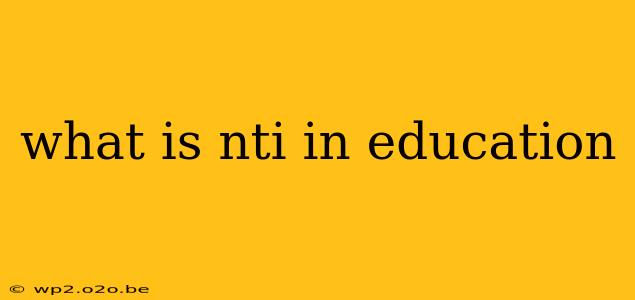In the ever-evolving landscape of education, the term "NTI" – or Non-Traditional Instruction – has become increasingly prevalent. But what exactly does it mean, and how does it impact students and educators? This comprehensive guide will delve into the definition, implementation, and implications of NTI in education.
Defining Non-Traditional Instruction (NTI)
NTI, in its simplest form, refers to any instructional method that deviates from the traditional classroom setting and its associated pedagogical approaches. This encompasses a wide range of methodologies, all sharing the common thread of delivering educational content and facilitating learning outside the conventional school building and schedule. This flexibility is often crucial for accommodating diverse learning styles and circumstances.
Key Characteristics of NTI:
- Flexibility in Time and Location: NTI allows students to learn at their own pace and convenience, often at home or in other locations outside the traditional school environment. This is particularly beneficial for students with scheduling conflicts, geographical limitations, or specific learning needs.
- Diverse Instructional Methods: NTI utilizes a variety of techniques, including online learning platforms, virtual classrooms, blended learning models, independent study projects, and distance learning programs. The methods used are often tailored to the specific subject matter and the learner’s needs.
- Technology Integration: While not always mandatory, technology plays a significant role in many NTI models, facilitating communication, content delivery, and assessment. This includes learning management systems (LMS), video conferencing tools, and interactive educational software.
- Focus on Individualized Learning: NTI often emphasizes personalized learning pathways, allowing students to focus on their individual strengths and weaknesses. This can lead to more effective learning outcomes compared to a one-size-fits-all approach.
Types of Non-Traditional Instruction
Several formats fall under the NTI umbrella. Here are some of the most common:
- Online Learning: Entire courses or programs are delivered online, utilizing various digital tools and platforms.
- Blended Learning: A combination of online and in-person instruction, often leveraging the strengths of both approaches.
- Distance Learning: Education delivered remotely, often employing correspondence courses, online resources, and virtual interactions.
- Independent Study: Students work independently on pre-defined projects or assignments, often with guidance from a teacher or mentor.
- Homeschooling: Parents or guardians assume primary responsibility for their child’s education at home.
The Impact of NTI on Education
The rise of NTI has brought about significant changes in the educational landscape, presenting both challenges and opportunities:
Advantages of NTI:
- Increased Access to Education: NTI makes education more accessible to students in remote areas, those with disabilities, and those with busy schedules.
- Personalized Learning: Tailored learning experiences cater to individual needs and learning styles, leading to improved outcomes.
- Flexibility and Convenience: Students can learn at their own pace and convenience, optimizing their learning environment.
- Enhanced Engagement: Interactive technologies and diverse learning methods can make learning more engaging and motivating.
Challenges of NTI:
- Digital Divide: Unequal access to technology and internet connectivity can create disparities among students.
- Lack of Face-to-Face Interaction: The absence of in-person interaction can affect social development and collaboration skills.
- Teacher Training and Support: Educators need adequate training and support to effectively implement NTI strategies.
- Assessment and Evaluation: Designing effective and equitable assessment methods for NTI can be challenging.
The Future of NTI in Education
Non-Traditional Instruction is not a fleeting trend; it's rapidly becoming an integral part of the modern education system. As technology continues to advance and pedagogical approaches evolve, we can expect NTI to play an even more significant role in shaping the future of learning. The key will be addressing the challenges and maximizing the opportunities presented by this transformative approach to education. Future developments will likely focus on bridging the digital divide, enhancing teacher training, and refining assessment strategies to ensure equitable and effective learning for all students.

